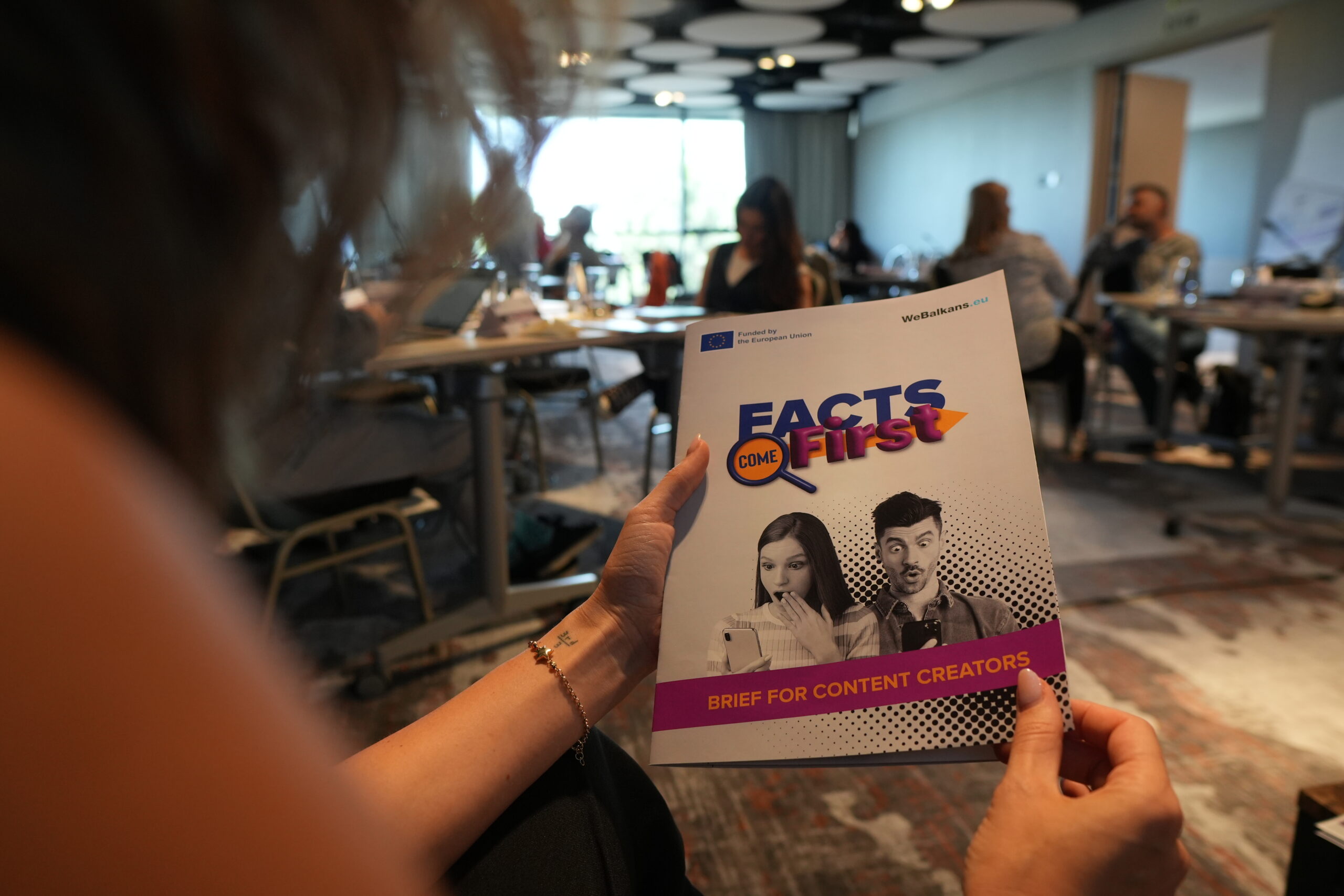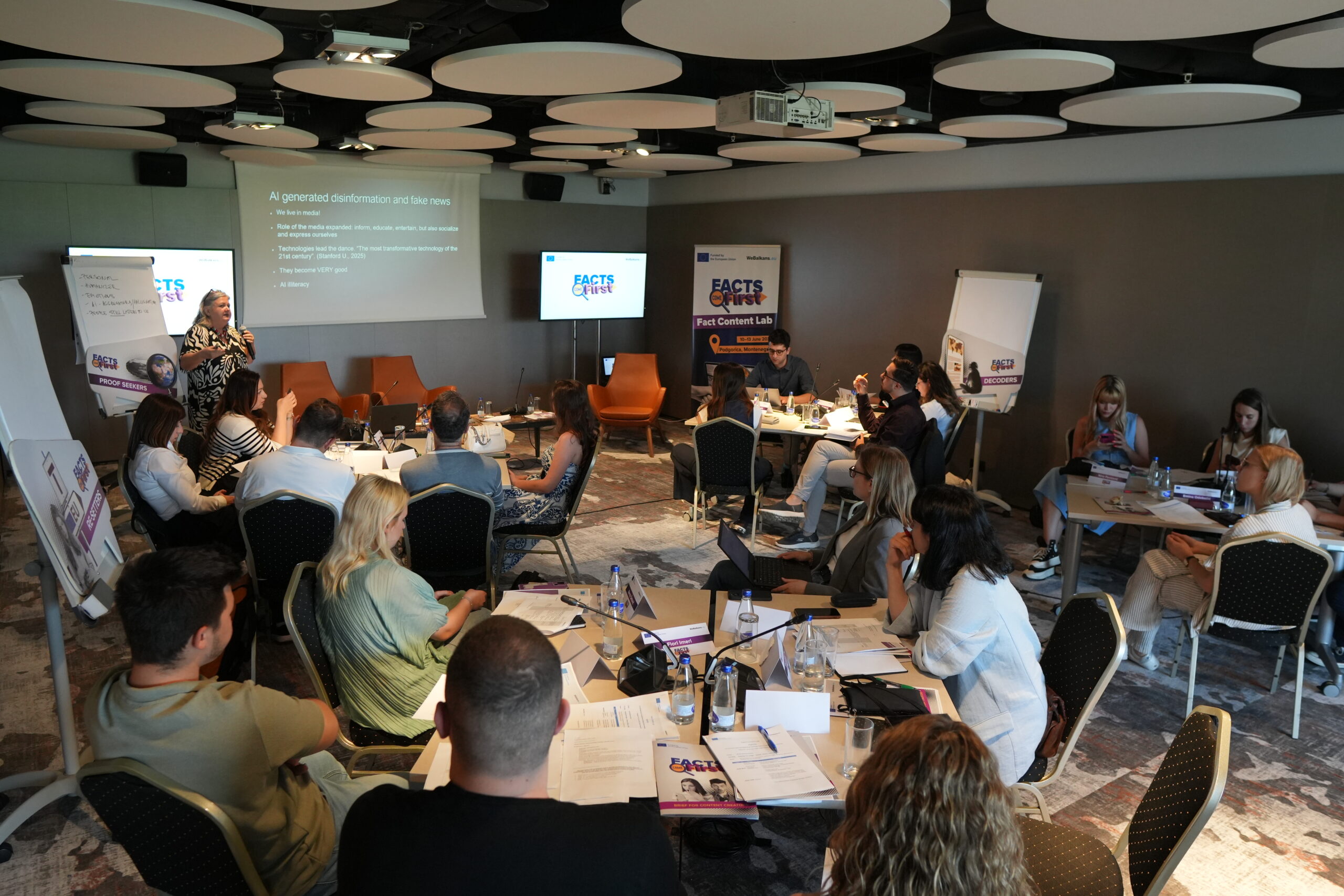
The institutions of the European Union are firmly committed to combating disinformation, as it threatens democratic processes, reinforces authoritarian tendencies, and increases the influence of harmful foreign actors. For this very reason, the EU supports a range of projects and activities in its partner countries in the Western Balkans that strengthen the fight against disinformation.
As a result of bringing together various professionals engaged in tackling disinformation, WeBalkans organised a major regional workshop called the Facts Content Lab in Podgorica, Montenegro, from 10 to 13 June. Journalists, influencers, fact-checkers, content creators, producers, and Young European Ambassadors (YEA) gathered to discuss local disinformation issues and ways to overcome them.
“When reporting and trying to verify sources and claims, you become aware not only of the speed at which disinformation spreads, but also of the sheer volume of it in public discourse—and how deeply it shapes public opinion. Our task is not only to correct false information, but also to regain people’s trust, letter by letter, story by story,” said journalist Dejan Šajinović, Nezavisne novine.
Across the event, participants explored how to counter disinformation in fresh and impactful ways. Working in dynamic teams, they developed creative multimedia contents designed to resonate with audiences and promote credible, fact-based sources.
Today, people receive more information in a single day than they did in an entire lifetime a century ago. Some of it is accurate, some distorted, and some deliberately designed to mislead, confuse, or exhaust the consumer. Certain media outlets are intentionally set up to spread falsehoods, with the aim of undermining trust in all media. They are particularly frequent during election campaigns or times of political crisis. Furthermore, many media platforms carry sponsored content that closely resembles real journalism yet is not marked as paid content—even though it should be.
Only a person who is objectively informed can make sound and well-informed decisions. In this context, it is vitally important to strengthen media literacy—especially among the youngest and the oldest, who are particularly vulnerable to disinformation, manipulative influence, and scams.
“Fighting disinformation isn’t only about presenting facts—it’s about rebuilding trust. People need to believe not just in the accuracy of information, but in the integrity of those who share it. Trust is the bridge between truth and understanding, and without it, facts can fall on deaf ears.” – said Ioana Avadani a media expert from Romania that moderated the Facts Content Lab in Podgorica.
In addition to the recent launch of the WeBalkans Disinformation Campaign, the Young European Ambassadors have also been active over the past two years, organising 27 media literacy workshops across the Western Balkans and reaching over 300 future media literacy educators.
“The idea is that participants of these workshops across all Western Balkan countries become media literacy educators for young people aged 13 to 16. A new round of workshops is currently being prepared, and all new members of the Young European Ambassadors network will receive training,” announces Armin Poljak from the network.

To help address this issue, the European Commission in 2024—ahead of the European Parliament elections—developed educational materials to help individuals build resilience to information manipulation
That same year, the Association JaBiHEU, which brings together Young Ambassadors for Freedom of Expression from across Bosnia and Herzegovina, in cooperation with World University Service Austria (WUS) and with financial support from the European Union, created the Freedom of Expression Guide which also provides basic guidelines for recognising disinformation.
“It is extremely important for young people—and indeed for all generations—to learn how to identify false information, especially in the Balkans. It’s essential to critically evaluate media, bearing in mind that they are profit-driven and aim to generate revenue, clicks, likes, and shares on social media—before they even consider delivering information in a responsible way,” said Ivan Subotić, a fact-checker from Belgrade, during a regional workshop for activists within the Regional Youth Dialogue for Europe project, funded by the European Union.
To begin with, anyone who suspects they are being exposed to disinformation should stay curious and continually ask themselves: Is what I’m reading or watching true? Why was it published? Who stands to benefit from this information? Is the content based on facts or just opinions? Are sources cited? Has any other outlet reported the same story? Does this content allow me to draw my own conclusions, or is it telling me what to think? Is the publisher’s imprint (impressum) clear—who owns the outlet, and do they have other businesses besides media?
Media literacy requires constant questioning—especially in an age of AI-generated algorithms and increasingly sophisticated disinformation tactics.
To learn more about the WeBalkans Disinformation Campaign, visit the dedicated web page where you can find useful information on how to combat disinformation narratives.
Today, people receive more information in a single day than they did in an entire lifetime a century ago. Some of it is accurate, some distorted, and some deliberately designed to mislead, confuse, or exhaust the consumer. Certain media outlets are intentionally set up to spread falsehoods, with the aim of undermining trust in all media. They are particularly frequent during election campaigns or times of political crisis. Furthermore, many media platforms carry sponsored content that closely resembles real journalism yet is not marked as paid content—even though it should be.
Only a person who is objectively informed can make sound and well-informed decisions. In this context, it is vitally important to strengthen media literacy—especially among the youngest and the oldest, who are particularly vulnerable to disinformation, manipulative influence, and scams.
“Fighting disinformation isn’t only about presenting facts—it’s about rebuilding trust. People need to believe not just in the accuracy of information, but in the integrity of those who share it. Trust is the bridge between truth and understanding, and without it, facts can fall on deaf ears.” – said Ioana Avadani a media expert from Romania that moderated the Facts Content Lab in Podgorica.
In addition to the recent launch of the WeBalkans Disinformation Campaign, the Young European Ambassadors have also been active over the past two years, organising 27 media literacy workshops across the Western Balkans and reaching over 300 future media literacy educators.
“The idea is that participants of these workshops across all Western Balkan countries become media literacy educators for young people aged 13 to 16. A new round of workshops is currently being prepared, and all new members of the Young European Ambassadors network will receive training,” announces Armin Poljak from the network.

To help address this issue, the European Commission in 2024—ahead of the European Parliament elections—developed educational materials to help individuals build resilience to information manipulation
That same year, the Association JaBiHEU, which brings together Young Ambassadors for Freedom of Expression from across Bosnia and Herzegovina, in cooperation with World University Service Austria (WUS) and with financial support from the European Union, created the Freedom of Expression Guide which also provides basic guidelines for recognising disinformation.
“It is extremely important for young people—and indeed for all generations—to learn how to identify false information, especially in the Balkans. It’s essential to critically evaluate media, bearing in mind that they are profit-driven and aim to generate revenue, clicks, likes, and shares on social media—before they even consider delivering information in a responsible way,” said Ivan Subotić, a fact-checker from Belgrade, during a regional workshop for activists within the Regional Youth Dialogue for Europe project, funded by the European Union.
To begin with, anyone who suspects they are being exposed to disinformation should stay curious and continually ask themselves: Is what I’m reading or watching true? Why was it published? Who stands to benefit from this information? Is the content based on facts or just opinions? Are sources cited? Has any other outlet reported the same story? Does this content allow me to draw my own conclusions, or is it telling me what to think? Is the publisher’s imprint (impressum) clear—who owns the outlet, and do they have other businesses besides media?
Media literacy requires constant questioning—especially in an age of AI-generated algorithms and increasingly sophisticated disinformation tactics.
To learn more about the WeBalkans Disinformation Campaign, visit the dedicated web page where you can find useful information on how to combat disinformation narratives.
Please wait while your video is being uploaded...
Don't close this window!